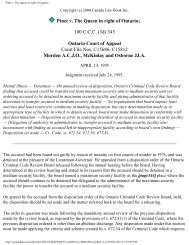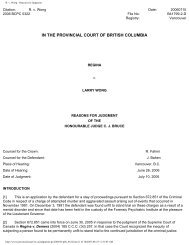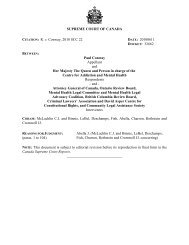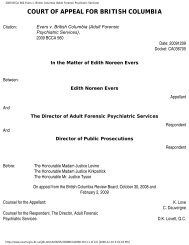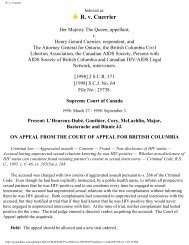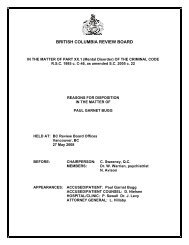IN THE MATTER OF PART XX.1 (Mental Disorder) - British ...
IN THE MATTER OF PART XX.1 (Mental Disorder) - British ...
IN THE MATTER OF PART XX.1 (Mental Disorder) - British ...
You also want an ePaper? Increase the reach of your titles
YUMPU automatically turns print PDFs into web optimized ePapers that Google loves.
1<br />
2<br />
3<br />
4<br />
5<br />
6<br />
7<br />
8<br />
9<br />
10<br />
11<br />
12<br />
13<br />
14<br />
15<br />
16<br />
17<br />
18<br />
19<br />
20<br />
21<br />
22<br />
23<br />
24<br />
25<br />
exclude members of the public from the disposition review hearing,<br />
without prejudice to Mr. Bryant's opportunity to renew his request at<br />
various strategic points in the hearing.<br />
Our reasons for denying the application are as follows. Our<br />
reading of the Criminal Code, and in particular s. 672.5(6), s. 672.51(7)<br />
and s. 672.51(11) persuade us that the legislation intends and presumes<br />
hearings of the Review Boards to be open to the public; otherwise, the<br />
power to exclude and the power to withhold disposition information would<br />
be redundant. The rationale for the presumption of openness is, of<br />
course, found in the long held value that openness to public scrutiny is<br />
fundamental to accountability and impartiality in the administration of<br />
justice. Nonetheless, it has been considered and determined by the B.C.<br />
Court of Appeal in the case of Blackman (B.C.C.A., Jan. 24, 1995,<br />
CA017480) and, more recently, by the Ontario Court of Appeal in Oshawa<br />
This Week (2002 (0J) No. 554), that the power to exclude under s.<br />
672.5(6) though valid, must be exercised with great caution; implemented<br />
on a case-by-case inquiry, and ultimately based upon evidence which<br />
satisfies both branches or criteria articulated in the subsection.<br />
The first branch of that test has to do with the best interests of the<br />
accused. That test has been interpreted to include evidence that the<br />
accused's treatment or mental state would be seriously compromised or<br />
interfered with by the attendance of the public and subsequent publication<br />
of the proceedings. Cases such as Blackman (supra) and the <strong>British</strong><br />
Columbia Review Board's decision in Fisher indicate that such a<br />
determination must be based on cogent, clear and compelling evidence<br />
5


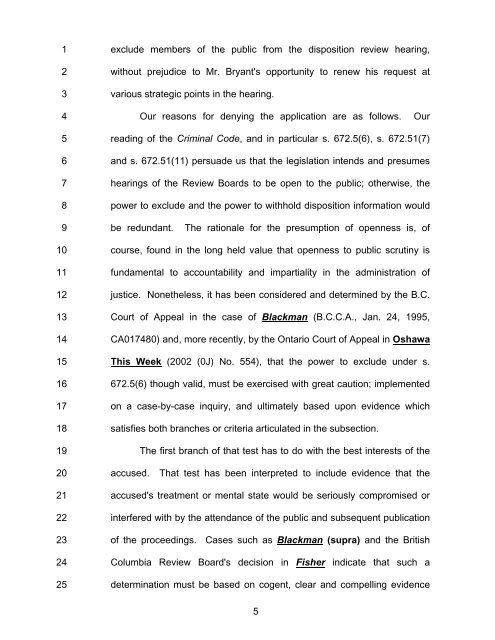
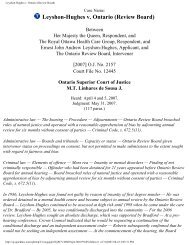
![LaFortune [LaFortunate] (Re) - British Columbia Review Board](https://img.yumpu.com/42779845/1/190x245/lafortune-lafortunate-re-british-columbia-review-board.jpg?quality=85)
